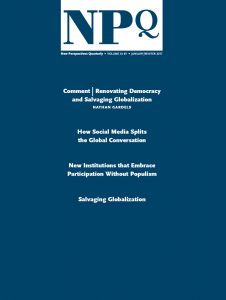Category: Sociology of Media & Communication
by ishein1 Two years ago, Google paid a copious, $1.65 billion to acquire the incipiently profitless Web site, YouTube. This video sharing website’s meteoric rise was in part due to its software’s facileness and accessibility. In this light, anyone with access to a computer and some gumption could post their own video. In an effort to transform their costly addition into a revenue-producing agent, Google announced that it would begin selling space to advertisers on YouTube’s search results pages. As...
by NickieWild With the United States’ presidential election season (finally) at an end, media researchers have begun the process of conducting what will likely be years’ worth of analyses on the various news outlets’ coverage of the historic campaign. A relatively new wrinkle in the landscape of television news has been the emergence of overtly left-leaning political commentators, specifically on cable channel MSNBC, ostensibly as a response to Fox’s overtly right-wing cable news personalities. The question many have asked is...
by bmckernan Since Barack Obama first announced his candidacy, social commentators have repeatedly wondered if Americans are ready to elect an African-American president. Numerous comedians responded by jokingly pointing out that America has already had a black president, in hit television shows such as 24 and Hollywood blockbusters like Deep Impact (see LA Times article). The success of Barack Obama’s campaign has sent media outlets scrambling to determine what has changed in America, when just days earlier they were interpreting...
by socanonymous Popular media and pundits alike are praising President-Elect, Barack Obama and his campaigners for taking his message to the internet. Much of Obama’s skills and experience in community organizing have been taken online. This election has definitely been history in the making, in more than one way. The successful linkage of technology, namely the internet, and politics has been proven effective in this election. There are countless benefits to the use of the internet for political gains including...
by dsantore More and more, it seems, French popular culture reflects a national battle being waged about sex, gender and social norms. Even for the supposedly sexually liberated French, we are told, recent events are notable. New York Times Fashion and Style reporter Elaine Sciolino writes of a set of French films, novels and political intrigues, all of which shine light on possible changes in the country’s views on sexual propriety and gender roles. Whether it is France’s Justice...
As the United States sits on the verge of electing Barack Obama the 44th President of the United States and the first African American to hold that office, many political pundits, members of the voting public and even some scholars believe that Senator Obama may have to overcome the “Bradley effect.” The Bradley effect refers to a 1982 California Gubernatorial race where Democratic candidate Tom Bradley, an African American, was ahead in the polls beyond the margin of error and...
by theoryforthemasses In the months leading up to the national election, the American news media has explored several demographic groups whose votes are up for grabs. The focus has largely been on African Americans, Latinos, and white female Clinton supporters; meanwhile, the Asian American vote (as though “Asians” can be qualitatively lumped together) has been largely overlooked. In her exploration of whether Asian Americans are considered “forever foreigners” or “honorary whites,” sociologist Mia Tuan paints a compelling picture of...
No one can deny that the technology available today is changing the face of politics. With the explosion of the internet, candidates are conducting much of their fundraising efforts and the promotion of their campaigns on a virtual campaign trail. Information concerning nominees of both parties can be found on social networking websites such as Facebook and Myspace, an infinite amount of blog sites, and video sites such as Google video and YouTube. In the video clip below from Newsworld, the use of...
by bmckernan For decades, social scientists interested in studying ideology have been grappling with how to appropriately examine cultural texts. On the one hand, scholars such as Adorno assert that popular texts should be primarily treated as superficial products designed to not only distract audiences but also to deny them critical agency. On the other hand, Gramsci’s conceptualization of ideology views popular culture as one possible method employed by the dominant classes to route potentially destabilizing sentiments into more ideologically...
[youtube=http://www.youtube.com/watch?v=PoDbO3NeTj4] (by linanne10) Race has long time been a crucial issue for the American society. The representation of people of color is especially tricky in the media, where the mainstream discourses are produced and reproduced largely by and for the white community. The recent debut of the comedy, “Chocolate News,” unrolls with the idea of creating a black sitcom “by and for” the African-American community. The French theorist, Michel Foucault, has noted the relationship between power and the production of...
by dsantore On Thursday, September 25, “CBS Evening News” broadcast a conversation between anchor Katie Couric and Republican Vice-Presidential candidate Sarah Palin. The interview would soon become the stuff of internet and TV legend. By now most of us are familiar with Governor Palin’s musings on Alaska’s proximity to Russia, on “The Bush Doctrine,” and other topics. The broadcast, like Palin’s ABC News interview that preceded it, will be remembered most for exposing the Vice-Presidential candidate’s wet-behind-the-ears entrance into national...
by Nickie Wild Russia’s parliament recently moved to ban the American television shows “South Park,” “Family Guy,” and “The Simpsons,” alleging that they sent negative messages to the country’s children. Russian cartoon network 2×2, which airs the programs, had its license up for renewal, and the Kremlin was not intending to grant it. Besides general accusations of moral depravity, the government particularly objected to the “South Park” episode Mr. Hankey’s Christmas Classics, in which a piece of human waste comes...
by delawaregrad Mass tourism encompasses the consumption of large quantities of branded goods including souvenirs and food and drink. This idea of mass consumption is most notably seen during large international sporting events where a type of “global village” is produced in which people world-wide watch multiple sporting events. According to Roche (2006), these global media events illustrate elements of ‘basic globalization’ where events promote universal values and provide cultural standards (spread of a consumer culture of the sport and...
by kiddingthecity Jammie Thomas was already famous enough to gain a Wikipedia entry all for herself. Now that she basically won the second trial against the powerful lobby Recording Industry Against America (RIAA) for alleged filesharing of copyrighted songs (24 apparently), has become a legend. As such, stories on the blogs bounce back and fro, but you get also glimpses of her private life and personality according to whom writes the piece (does it matter if she is a single...
by nmccoy1 Fashion has pitched itself as an ‘art,’ as a reflection of society and current issues (see article below). But fashion, like other centers of commerce, is planned in advance for the purpose of profit. This spring’s fashion collections do not, or rather, could not be symbolic of the current financial crisis simply because they were envisioned months if not years ago. Habermas illustrates the ways in which this use of fashion is problematic. First, conceived of as an...
by bmckernan A recent NY Times article examines the blurring of literature and videogames by looking at efforts made by book publishers to promote their books with corresponding videogames. One such example, the popular series The Software, includes a videogame companion that forces players to read the corresponding books in order to find clues necessary to progress in the game. While some may criticize videogames as a shallow medium relative to literature, others suggest that videogames may actually help develop...


















